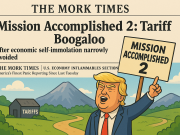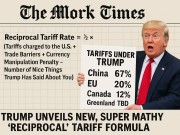Bridging the Divide: The Phone Call That Could Reshape U.S.-China Relations
In the intricate tapestry of international diplomacy, few bilateral relationships hold as much weight as that between the United States and China. Their interactions wield significant influence over global economic trends, security concerns, and cultural exchanges. Today, the spotlight turns to U.S. Treasury Secretary Scott Bessent, who stands at a critical juncture, advocating for a dialogue that could transcend the customary diplomatic channels.
A phone call, although seemingly mundane in everyday life, takes on monumental significance when it involves the leaders of superpowers. As Bessent orchestrates an effort to encourage a conversation between President Donald Trump and President Xi Jinping, the world waits with bated breath. This dialogue, should it happen, is not just about leaders exchanging pleasantries; it serves as a possible gateway to breaking the deadlock that has characterized U.S.-China relations in recent times.
The past few years have witnessed a series of stalled discussions between these two major players, largely due to geopolitical complexities. Economic pressures, trade imbalances, technology disputes, and human rights debates have all contributed to a landscape of tension and misunderstanding. Consequently, the world economy faces the ripple effects of such strained relations, manifesting in market volatility, disrupted supply chains, and hesitant international investments.
Scott Bessent’s initiative represents an acknowledgment of the need for rejuvenated diplomacy. A phone call, often so easily dismissed, might hold the potential to thaw the icy relations and breathe life into negotiations that have long been stuck. It symbolizes a willingness to bridge the divide, showcasing both nations’ intent to seek common ground for the greater good.
The implications of a successful conversation are manifold. Economically, it could pave the way for new trade agreements and more balanced economic policies. Politically, it could mend strained alliances and foster cooperation on global issues such as climate change, cybersecurity, and global health. Culturally, it represents an opportunity for both nations to reinforce their mutual understanding and appreciation of each other’s heritage, enriching global culture.
Yet, despite its potential, the path to this moment is fraught with challenges. The leaders’ willingness to engage in open and constructive dialogue is crucial. It calls for a demonstration of mutual respect and recognition of each other’s sovereignty and value systems. Moreover, navigating domestic pressures while striving for international compromise is a delicate balance that both leaders must master.
The worknews community, engaged in a rapidly evolving global environment, recognizes the importance of such diplomatic efforts. As professionals invested in international trade, economics, and policy-making, understanding the dynamics of U.S.-China relations is vital. A single conversation could unleash possibilities that reshape industries and redefine competitive strategies across the world.
In conclusion, the diplomatic wheels are indeed turning, with Scott Bessent at the helm of a potentially transformative moment in U.S.-China relations. The call, should it happen, is more than just a dialogue; it’s a statement—a commitment to make diplomacy work in a world beset by division and uncertainty. As the world watches, this effort to bridge the divide serves as a reminder of diplomacy’s enduring power to inspire change and foster a future steeped in collaboration and peace.



























